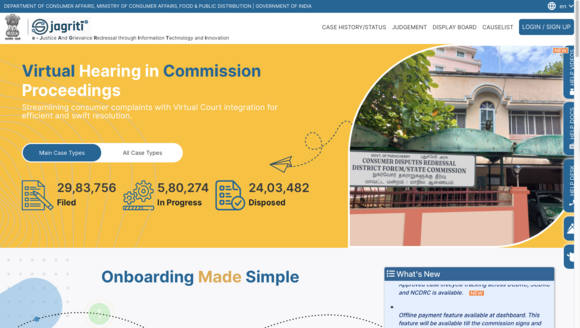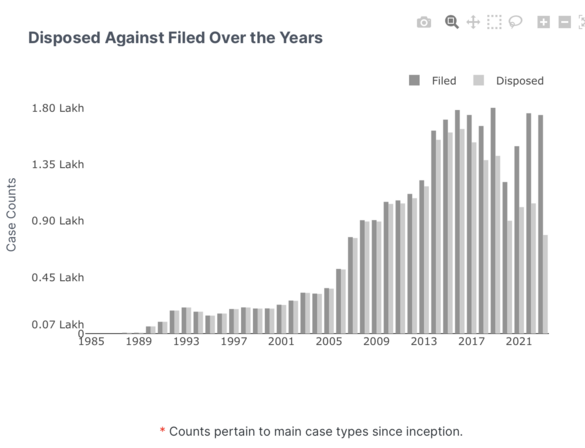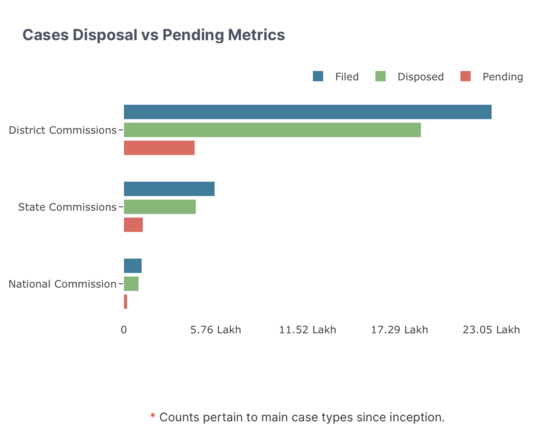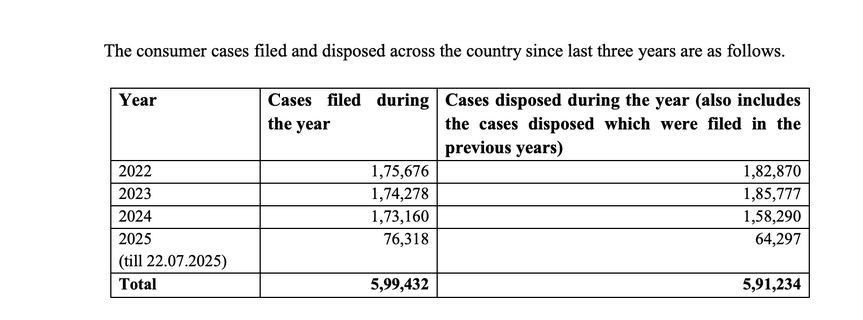Consumer court
हिंदी में देखने के लिए क्लिक करें
What is a Consumer Court?
Consumer courts are special-purpose courts, established to redress the grievances of the consumers, given the power imbalance between manufacturers, service providers and consumers. They were conceived of as an alternative to the time-consuming procedures followed in civil courts.[1]
They were initially established under the Consumer Protection Act, 1986[2], and are now functioning under the Consumer Protection Act, 2019. The Act provided for the establishment of three fora comprising the District Consumer Disputes Redressal Commission, the State Consumer Disputes Redressal Commission, and the National Consumer Disputes Redressal Commission.[3]
The remedies provided under the Act are in addition to and not in derogation of remedies under other laws.[4]
Legal provision(s) relating to 'Consumer Court'
Consumer courts are defined with reference to the subject matter of the disputes they adjudicate.
Consumer Dispute
Section 2 of the Consumer Protection Act, 2019[5] defines 'consumer dispute' as a dispute where the person against whom a complaint has been made, denies or disputes the allegations contained in the complaint. A 'consumer' for the purposes of the act is any person who “buys any goods or services for a consideration which has been paid or promised or partly paid and partly promised, or under any system of deferred payment and includes any user or beneficiary of such goods or services other than the person who buys such goods or hires the services for consideration paid or promised or partly paid or partly promised, or under any system of deferred payment, when such use is made with the approval of such person, but does not include a person who obtains such goods or avails such services for resale or any commercial purpose.” has been mentioned in section 2(7) of the Consumer Protection Act, 2019[6]
Complaints involving highly disputed questions of facts or cases involving tortious acts or criminality like fraud or cheating, cannot be decided by the consumer courts.[7]
Jurisdiction
Consumer Protection (Jurisdiction of the District Commission, the State Commission and the National Commission) Rules, 2021
Notified on 30 December 2021, these rules redefine pecuniary jurisdiction in consumer dispute forums across India. Under the Consumer Protection Act, 2019, jurisdiction is now based on the consideration paid for goods or services, not the compensation claimed. Specifically, the District Commission handles claims up to ₹ 50 lakh; the State Commission handles those over ₹50 lakh and up to ₹2 crore; and the National Commission takes cases above 2 crore.[8]
Mediation
Consumer Protection (Mediation) Rules, 2020
Effective from 20 July 2020, these rules establish the legal framework for mediation in consumer disputes.[9] Every consumer commission must set up a Mediation Cell, and the rules specify eligibility, mediator qualifications, confidentiality, and process timelines. Notably, cases involving serious fraud, criminal allegations, or medical negligence are excluded . The process is voluntary and confidential. If mediation fails, parties can revert to traditional adjudication. The rules also allow mediator fees to be paid from the Consumer Welfare Fund, easing the financial burden on consumers .
Product Liability
Under the Consumer Protection Act, 2019, Section 82[10] explicitly provides for product liability, enabling a consumer to file a claim against a manufacturer, product seller, or service provider for harm caused by a defective product or deficient service. Section 84[11] outlines the liability of manufacturers, which includes defects in design, manufacturing, departure from specifications, or failure to provide adequate warnings. This provision strengthens consumer rights by placing clear legal responsibility on businesses for the safety and reliability of their products.
Procedure
Expeditious Disposal
As per Section 38 (7) of the Consumer Protection Act, 2019, every complaint shall be disposed of as expeditiously as possible and endeavour shall be made to decide the complaint within a period of three months from the date of receipt of notice by opposite party where the complaint does not require analysis or testing of commodities and within five months if it requires analysis or testing of commodities. To serve the interest of speedy justice to the end consumers, Consumer Protection Act states that no adjournment shall ordinarily be granted by the consumer commissions unless sufficient cause is shown and the reasons for grant of adjournment have been recorded in writing by the Commission
Types of Consumer Courts
According to the Consumer Protection Act, 2019, there are three types of consumer courts.
District Consumer Disputes Redressal Commission
Pecuniary Jurisdiction
The District Consumer Disputes Redressal Commission at the district level is established by the state government in each district by the state. It has the jurisdiction to entertain complaints where the value of the goods or services and the compensation, if any, claimed does not exceed Rs 50 Lakhs.[12] An objection as to pecuniary jurisdiction has to be taken at the District Commission itself, not the appellate stage.[13]
Territorial Jurisdiction
According to section 34 of the Consumer Protection Act,2019 [14]a complaint may be filed in that District Commission within the local limits of whose jurisdiction:
(1) the opposite party or where there are more than one party, each of the opposite parties resides or carries on business or has a branch office or works personally for gain, at the time of the institution of the complaint; or
(2) any of the opposite parties, where there are more than one, resides or carries on business or has a branch office or personally works for gain at the time of the institution of the complaint; or
(3) where cause of action either wholly or in part arises; or
(4) where the complainant resides or personally works for gain.
State Consumer Disputes Redressal Commission
Section 42 of the Consumer Protection Act,2019, The State Consumer Disputes Redressal Commission is established at the state level by the state government of each state.[15] It ordinarily functions at the state capital but may perform its functions at such other places as the state government may, in consultation with the state commission notify in the Official Gazette.[16]
Pecuniary Jurisdiction
As per Section 47 of the Consumer Protection Act, 2019[17], the forum has jurisdiction to entertain complaints where the value of the goods or services paid as consideration is between Rs. 50 Lakhs and Rs. 2 Crores. It is also required to deal with cases which arise as a result of appeals against the orders of any District Commission within the state.The Supreme Court in Rutur Mihir Panchal v. Union of India upheld the constitutional validity of determining pecuniary jurisdiction under the State Commission based on consideration paid, not the compensation claimed, reinforcing the shift brought by the Consumer Protection Act, 2019 and its 2021 amendment.
Territorial Jurisdiction
As per section 47 of the Consumer Protection Act, 2019, [18]a complaint shall be instituted in a State Commission within the limits of whose jurisdiction-
- the opposite party or each of the opposite parties, where there are more than one, at the time of the institution of the complaint, resides or carries on business or has a branch office or personally works for gain; or
- any of the opposite parties, where there are more than one, at the time of the institution of the complaint, resides, or carries on business or has a branch office or personally works for gain, provided in such case, the permission of the State Commission is given; or
- the cause of action, wholly or in part, arises; or
- the complainant resides or personally works for gain.
National Consumer Disputes Redressal Commission
The National Consumer Disputes Redressal Commission (NCDRC)[19] is a quasi-judicial commission in India, established in 1988 under the Consumer Protection Act, 1986. The National Consumer Disputes Redressal Commission has been established in the National Capital Region by the Central Government.
Its head office is located in New Delhi. As per Rule 3(12)(a) of the Tribunal (Conditions of Service) Rules, 2021, the Commission is headed by a sitting or retired Judge of the Supreme Court of India or a sitting or retired Chief Justice of a High Court. The current President is Hon’ble Mr. Justice Amreshwar Pratap Sahi, former Chief Justice of Patna and Madras High Courts.
According to Section 21 of the Consumer Protection Act, 1986[20], the National Commission has jurisdiction to entertain complaints valued at more than ₹2 crore, and also holds appellate and revisional jurisdiction over orders passed by the State Commissions and District Forums.
Under Section 23[21] of the same Act, any person aggrieved by an order of the NCDRC may file an appeal to the Supreme Court of India within 30 days of the order.
It has the jurisdiction to entertain complaints where the value of the goods or services paid as consideration exceeds Rs. 2 Crores. Any person aggrieved by an order passed by the State Commission can appeal to the National Commission, and the latter binds the parties unless a further appeal is made to the Supreme Court.
Technological Transformation
E-Jagriti
e-Jagriti[22] portal has been developed to enhance consumer grievance redressal through a micro-service architecture, Artificial Intelligence / Machine Learning integration and latest features like faceless onboarding and role-based dashboards. It unifies existing applications (OCMS, e-Daakhil, NCDRC CMS, CONFONET application) into a single, scalable system that significantly benefit consumers by enabling them to file complaints seamlessly from anywhere, anytime, with multi-lingual support. The integrated platform streamlines the grievance redressal process, offering faster resolution and enhanced transparency.
Salient features of E-jagriti Portal
- File complaints online: Lodge grievances directly through the app without needing to visit a commission.
- Track your case: Get real-time updates from District (DCDRC), State (SCDRC), and National (NCDRC) Consumer Commissions.
- Know your rights: Access clear, detailed information about consumer rights and responsibilities.
- Stay informed: Get updates on the Public Distribution System and government schemes related to consumer welfare.
- Use it easily: Built with a simple, intuitive interface so it works for everyone—no legal expertise required.

Appearance in official Database
E-Jagriti

Disposal trends


Parliamentary Responses
Disposal Trends

Research that engages with Consumer Courts
Re-Imagining Consumer Forums: Introducing a spatial design approach to court infrastructure
Re-Imagining Consumer Forums Introducing A Spatial Design Approach to Court Infrastructure authored by Reshma Shekhar,Pooja Shastry,Shreya Tripathy and Preetha Dhar is a cross-disciplinary effort from Vidhi's JALDI Innovation Lab in partnership with the Srishti Institute of Art, Design, and Technology. It comes up with a blueprint for a consumer court infrastructure that is friendly to litigants, is replicable, scale-able, and will help achieve the goals of consumer protection laws. Building Better Courts, a survey on the infrastructure accessibility of 665 District Courts in India, was previously conducted by the Justice, Access & Lowering Delays in India (JALDI) initiative at Vidhi. Moving forward, the initiative plans to work on other aspects of court infrastructure, such as a model criminal justice court for women.[23]
Institutionalizing Justice: Gram Nyayalayas and Consumer Courts
Institutionalising Justice: Gram Nyayalayas and Consumer Courts [24] highlights two promising measures adopted by the judiciary in the pursuit of access to justice: (a) the gram nyayalayas set up under the Gram Nyayalayas Act, 2008 and (b) the consumer forums established under the Consumer Protection Act, 1986. They also work as good illustrations of the ‘concerted effort' in India to move cases out of the formal courts, with alternate dispute resolution mechanisms assuming increasing significance and taking various forms. The Study of Law and India’s Society: The Galanter Factor’, Law and Contemporary Problems [25]analyzes how consumer forums have been the focus of evolving reforms for improvement.
International Experiences
Different countries have different systems in place to enforce the consumer protection laws in their respective countries.
In the USA, various federal agencies enforce consumer protection laws, such as the Federal Trading Commission, the Consumer Financial Protection Bureau[26], and the Food and Drug Administration[27]. In the UK, there are two primary agencies for enforcement: Trading Standard Services[28] and the Competition and Markets Authority[29]. In Australia, the Australian Consumer Law is enforced by the Australian Competition and Consumer Commission[30] at the centre level and state and territory consumer protection agencies at respective levels. In Japan, the Consumer Affairs Agency[31] (CAA) is responsible for enforcing most of the consumer protection laws and has various specific bodies mainly under different Ministries that enforce specific laws.[32]
References
- ↑ International Journal on Consumer Law and Practice (2021) Evolution of Consumer Courts in India: The Consumers Protection Act 2019 and emerging themes of Consumer Jurisprudence by Ankur Saha and Sri Ram Khanna https://repository.nls.ac.in/cgi/viewcontent.cgi?article=1012&context=ijclp
- ↑ Repealed by Consumer Protection Act, 2019 https://www.indiacode.nic.in/handle/123456789/15256
- ↑ Sections 28, 42 and 53 of the Consumer Protection Act, 2019 https://indiankanoon.org/doc/178872167/ https://indiankanoon.org/doc/40052571/https://indiankanoon.org/doc/119475165/
- ↑ Enathu Services Co-op Bank v The Consumer Disputes Redressal Forum, AIR 2011 Ker 145 https://indiankanoon.org/doc/536700/
- ↑ Section 2 of the Consumer Protection Act, 2019 https://indiankanoon.org/doc/47873513/
- ↑ Section 2 (7), Consumer Protection Act, 2019 https://indiankanoon.org/doc/26796719/
- ↑ C.M.D., City Union Bank Limited v. R. Chandramohan 2023 SCC OnLine SC 341 https://indiankanoon.org/doc/151182343/
- ↑ Consumer Protection (Jurisdiction of the District Commission, the State Commission and the National Commission) Rules, 2021 https://www.pib.gov.in/PressReleasePage.aspx?PRID=1786342#:~:text=District%20Commissions%20shall%20have%20jurisdiction,consideration%20exceeds%202%20crore%20rupees.
- ↑ Consumer Protection (Mediation) Rules, 2020https://cdnbbsr.s3waas.gov.in/s3194cf6c2de8e00c05fcf16c498adc7bf/uploads/2022/01/2022010451.pdf
- ↑ Section 82 in Consumer Protection Act, 2019 https://indiankanoon.org/doc/175508571/
- ↑ Section 84 in Consumer Protection Act, 2019 https://indiankanoon.org/doc/197620408/
- ↑ Centre notifies rules for Consumer Protection (Jurisdiction of the District Commission, the State Commission and the National Commission) Rules, 2021 https://www.pib.gov.in/PressReleasePage.aspx?PRID=1786342
- ↑ EMPIRE BUILDERS Versus ANTHONY XAVIER ANDRADE Date of Decision: 11 February 2009 Citation: 2009 LawSuit(CO) 1111 https://lawsuitcasefinder.com/casedetail?id=U2FsdGVkX19jWnpljRawtlplo209pIuiKYdgzrMurgLpIoMgs5
- ↑ Section 34, Consumer Protection Act, 2019 https://indiankanoon.org/doc/59791555/
- ↑ See Section 42 of the Consumer Protection Act, 2019 https://indiankanoon.org/doc/40052571/
- ↑ Provided that the State Government may, by notification, establish regional benches of the State Commission, at such places, as it deems fit. (As per Section 42 of the Consumer Protection Act, 2019) https://indiankanoon.org/doc/40052571/
- ↑ https://indiankanoon.org/doc/4166410/
- ↑ See Section 47 of the Consumer Protection Act, 2019. https://indiankanoon.org/doc/117738049/
- ↑ NATIONAL CONSUMER DISPUTES REDRESSAL COMMISSION https://ncdrc.nic.in/
- ↑ Section 21 in The Consumer Protection Act, 1986 https://indiankanoon.org/doc/86602/
- ↑ Section 23 in The Consumer Protection Act, 1986 https://indiankanoon.org/doc/271754/
- ↑ https://e-jagriti.gov.in
- ↑ VIDHI Centre for Legal Policy, Re-Imagining Consumer Forums: Introducing a spatial design approach to court infrastructure (2021) authored by Reshma Shekhar,Pooja Shastry,Shreya Tripathy and Preetha Dhar pg 16 https://vidhilegalpolicy.in/wp-content/uploads/2021/02/Re-Imagining-Consumer-Forums-Full-Report.pdf
- ↑ Ashwini Obulesh, Institutionalising Justice: Gram Nyayalayas and Consumer Courts(PARAGRAPH 197-200) https://www.dakshindia.org/state-of-the-indian-judiciary/34_chapter_19.html#_idTextAnchor485
- ↑ Robert Moog. 2008. ‘The Study of Law and India’s Society: The Galanter Factor’, Law and Contemporary Problems, 71(2): 129–137, p. 129. Also available online at http://scholarship.law.duke.edu/cgi/viewcontent.cgi?article=1470&context=lcp.
- ↑ Official website of The FTC’s Bureau of Consumer Protectionhttps://www.ftc.gov/about-ftc/bureaus-offices/bureau-consumer-protection
- ↑ An official website of FDA https://www.fda.gov/
- ↑ Link to find your local Trading Standards office https://www.gov.uk/find-local-trading-standards-office
- ↑ Official website of CMA https://www.gov.uk/government/organisations/competition-and-markets-authority
- ↑ Australia's national competition, consumer, fair trading and product safety regulator https://www.accc.gov.au/
- ↑ The Consumer Affairs Agency in Japan (CAA) https://www.caa.go.jp/en/
- ↑ Comparison of Consumer Laws in Different Countries: https://www.lexology.com/library/detail.aspx?g=1c2dfca4-1893-49e7-8590-35ff02499515#:~:text=By%20far%20UK%20and%20Australia,redressal%20and%20other%20supporting%20statutes.&text=In%20India%20a%20consumer%20has,has%20been%20paid%20or%20promised
